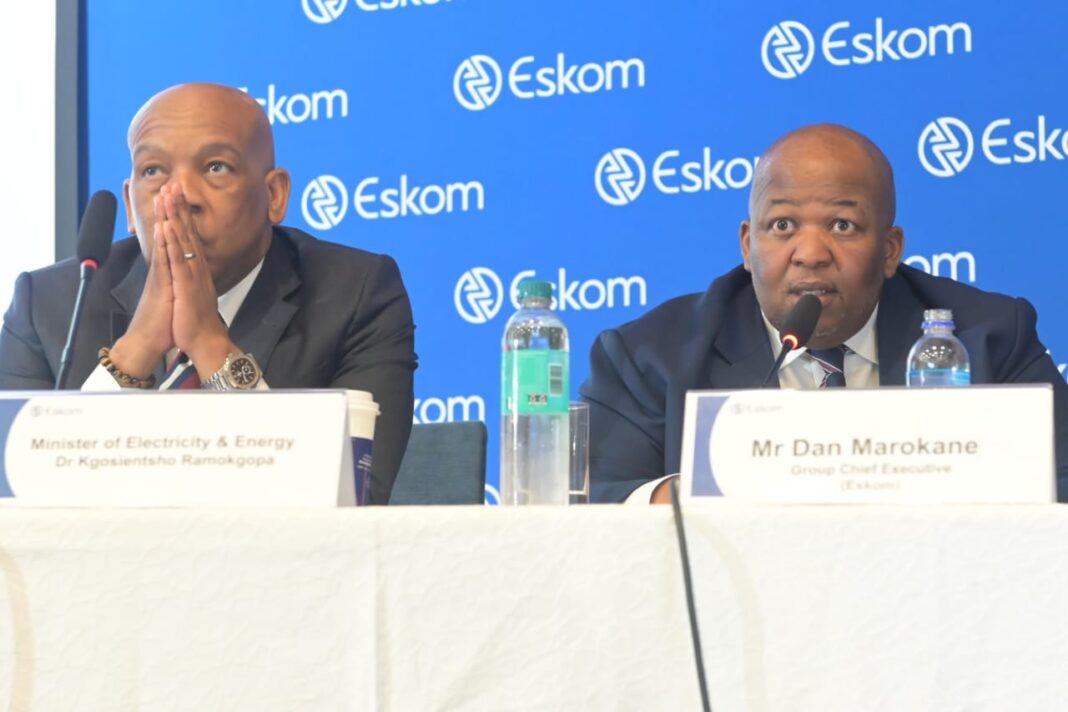By Johnathan Paoli
Eskom is set to report its first annual profit in eight years, with projections exceeding R10 billion for the financial year ending March next year.
Eskom chair Mteto Nyati welcomed the achievement as indicative of the power utility’s progress in light of the challenges.
“Today’s challenging results demonstrate the extremely tough choices we had to take, for which we are experiencing the benefits of today,” Nyati told reporters.
CEO Dan Marokane praised the anticipated milestone, saying it was due to significant operational improvements and the implementation of a critical government debt relief package.
The utility announced its financial results on for the year ending in March 2024 on Thursday, revealing a loss after tax of R55 billion, an increase from the R26.1 billion loss in the previous fiscal year.
The widened loss stemmed from a one-off tax charge linked to the separation of its transmission division, a structural reform mandated by President Cyril Ramaphosa’s plan to enhance Eskom’s efficiency.
Despite the challenging financial year, which Marokane described as difficult building, Eskom has begun to reap the benefits of its Generation Recovery Plan.
This initiative, which prioritises improved maintenance and operational efficiency, has significantly reduced load-shedding.
For the first six months of the next financial year, the nation has experienced nine consecutive months without load-shedding, a dramatic shift compared to the 329 days of scheduled outages during the previous one.
Eskom’s CFO Calib Cassim highlighted key financial strides contributing to the projected profit.
Gross debt decreased by R11.7 billion to R412.2 billion, buoyed by a government debt-relief package worth R250 billion over the medium term.
Additionally, a 12.7% tariff hike and reduced diesel costs, down by R11.9 billion, have significantly improved cash flow.
“While operational stability and debt-relief measures have created a favourable environment, systemic issues such as municipal debt must be urgently addressed,” Cassim said.
As of November, unpaid municipal debt had escalated to R95 billion, threatening to undermine Eskom’s long-term financial sustainability.
Eskom’s restructuring into three separate entities, which is focused on generation, transmission and distribution, forms part of a broader reform strategy aimed at enhancing accountability and operational efficiency.
The separation of its transmission unit, finalised in March this year, triggered a de-recognition of deferred tax assets valued at R36.6 billion, contributing to the loss.
The energy availability factor (EAF), a critical metric, reached 62.97% in the first half of the new financial year.
The utility aims to achieve a 70% EAF by March next year as part of its Generation Recovery Plan.
Eskom’s leadership acknowledged the role of government and public stakeholders in the turnaround.
“This journey has been challenging, but we are starting to see the results of the tough decisions we’ve made. For South Africa to fully benefit from these improvements, it is essential to address affordability and ensure sufficient investment in infrastructure,” Marokane said.
Meanwhile, DA electricity spokesperson Kevin Mileham expressed concern regarding the late release of the utility’s financial statements.
Mileham said despite receiving a handout of R76 billion, the utility posted a pre-tax loss of R25 billion, ballooning to R55 billion after tax.
“While some might suggest that this highlights the urgent need for massive tariff increases, the reality is that it is Eskom’s inability to do the bare minimum in terms of financial management, such as producing its annual financial statements on time,” he said.
Last month, during an oversight visit to Eskom’s crumbling residential complex in Mpumalanga, Mileham confirmed an example of the entity’s reckless mismanagement, wasting R840 million in public funds on an abandoned project.
He maintained that Eskom’s ongoing mismanagement was a slap in the face of South African citizens and that his party would not stand by while taxpayers and consumers were made to bear the brunt.
Mileham reiterated his party’s call for urgent reforms, including opening the energy market to independent power producers, which he said would increase transparency as well as holding accountable those responsible for financial mismanagement.
INSIDE POLITICS

